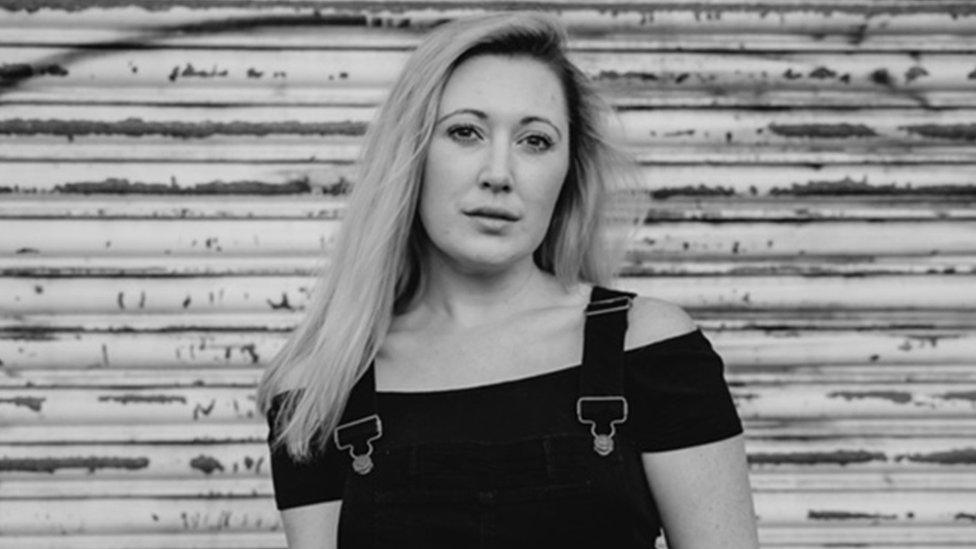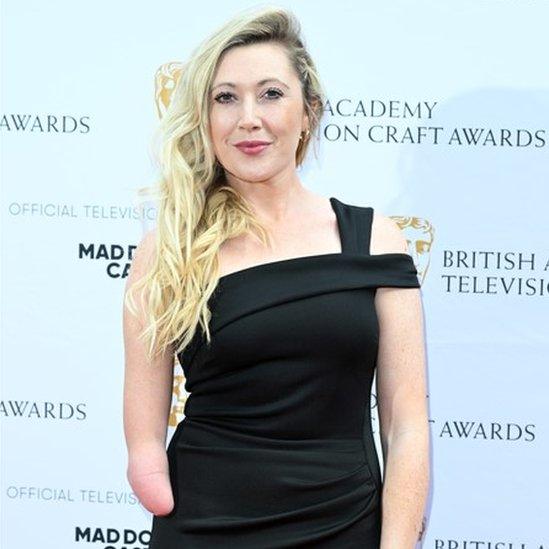Melissa Johns: The disabled actress and the stolen intimate photos (original) (raw)
 Image source, Melissa Johns
Image source, Melissa Johns
July is Disability Pride month which is all about recognising and celebrating what being disabled means. Actor, Melissa Johns, reveals the moment she reclaimed control over her body when her worst fears were realised and intimate photographs of her were stolen.
"Growing up, I absolutely hated my body," the former Coronation Street actress told the BBC Access All podcast.
Melissa was born without her right arm below the elbow and did everything she could to hide it.
"I would get to dates early so I could plan which side I would be sitting on, I would choreograph sex.
"I literally became this master of manipulation, and it was very draining."
For Melissa, who's best known for her roles in BBC One drama, Life, and ITV's Grantchester it was watching a home video from the 1990s which was the start of accepting her body.
"My grandad bought his first video camera in 1990 - the year I was born. We were watching some childhood footage and I just saw this little girl on the screen and she was dancing and she was so free.
"I remember sitting and watching her and thinking, 'I'm not giving you the life you deserve'. That was a massive turning point."
Melissa had just started to come to terms with being disabled - dancing at parties, rather than sitting where she wouldn't stand out - when her "worst fear" was realised.
In 2018, Melissa had just completed her stint as Imogen Pascoe in Coronation Street when she glanced at her phone. She had 21 missed calls from her agent.
She thought it might be about her next job, "maybe it was Spielberg calling?". Excited, she called her agent.
"That's when she told me," Melissa says. "The worst thing that could have happened to me would have been for my iCloud to have been hacked and my intimate, explicit photos released online.
"And that is exactly what had happened."

Listen to Access All on BBC Sounds
In the latest Access All podcast, listen to Melissa talk more about her experience of having her personal photographs stolen.
Plus, Nikki Fox and Emma Tracey chat about their high street habits and why it's hard to be a shopaholic if shops are inaccessible.


A newspaper had made contact to say nude images of Melissa had been leaked online and were quickly spreading across pornographic sites - including those which fetishize disability.
"It felt like my life was about to be over."
Not only did she fear for her career and work she does with young disabled people, but the body she was working hard to accept was being scrutinised by the world and she had no time to brace for it.
"Suddenly I had to become Ok with my body essentially being cast as public property," she says.
Melissa turned to the internet to see for herself. She clocked that she was in photos next to Jennifer Lawrence, which had also been stolen. Melissa quipped on the Access All podcast that for a fraction of a second she thought, "wow, I've made it," before the "realisation crashed down".
Then she saw the comments.
"I'd never seen anything like it," she says. "My body had been ripped apart as a disabled woman.
"It wouldn't have got as much traction, I don't think, had it not been because it was this blond haired actress with one arm."
She says there is often an unwanted, unfounded, curiosity around sex and disability and this fuelled those corners of the internet.
But the situation is more nuanced than most people think, Melissa says. She had wanted to take the photographs and had done so in good faith that they would remain private. She doesn't want people to stop that because of other peoples' actions.
"If you want to send someone a photo, send someone a photo. Do what makes you feel good. I sent photos of a body that actually, in that moment, I felt quite good about it. Therefore, I'm not the one to blame here.
"Get angry if you have your privacy disrespected, but what we don't need on top of that is shame for our bodies."
Melissa did get angry. Then she got creative. Later, she got funny.
She had always been good at telling stories and "clowning around" and she slowly began to realise here was a story to tell, which could help her reclaim that violation and her body. "It has to come from a place of empowerment," she says.
Just before the pandemic, Melissa won a place on Bafta Elevate, a scheme which supports those from underrepresented backgrounds in their careers.
 Image source, Getty Images
Image source, Getty Images
With experts around her, she started to write about her experience for the theatre.
An early script was described by Phoebe Waller-Bridge as "exhilaratingly honest". It went on to become the one-woman show, Snatched, which has just finished its first UK-wide tour.
The show delves deep into her life and insecurities and of course her darkest moment, but it's funny and accompanied by 90s music hits.
It also got her back on track to accepting her body and what she went through.
"Doing a one woman show is the best therapy," she says. "I can talk about it so confidently, in the sense that it doesn't hurt me anymore."
It has been quite the uplifting year for Melissa who also won Bafta's The Special Award for her work with TripleC which supports deaf, disabled and neurodivergent artists to work in the arts and media.
The team includes comedian Laurence Clarke, who has cerebral palsy, and fellow Coronation Street alumni, Cherrylee Houston, who played Izzy Armstrong, and is a wheelchair-user.
As much as it is a gateway for disabled artists to break into the industry, it is also about the industry learning about disability and inclusion.
Melissa believes this lack of understanding around disability is also the root cause of some of the trolling she faced when her photos were leaked. Rather than showing hatred at the name-callers, she tries to understand and empathise with their lack of knowledge.
"If I don't have that, I will scream, I'll be upset, I'll be angry.
"If we battled with anger every single day, we'd just be exhausted," she says.
Melissa is currently playing Miss Scott in Grantchester, a British detective drama set in the 1950s. Its seventh series is about to be released in America where it's a big hit.
It means even more people will see the person Melissa has worked so hard to love.
She says facing her "worst fear" has not only helped her accept herself, but also taught her how to face other unexpected situations.
"Most of the time in life, you can't change what happens to you. But the one thing that we can have freedom over is the way that we respond to it.
"Sometimes that's the only thing we've got ownership over."
You can listen to the podcast and find information and support on the Access All page.
Related internet links
The BBC is not responsible for the content of external sites.